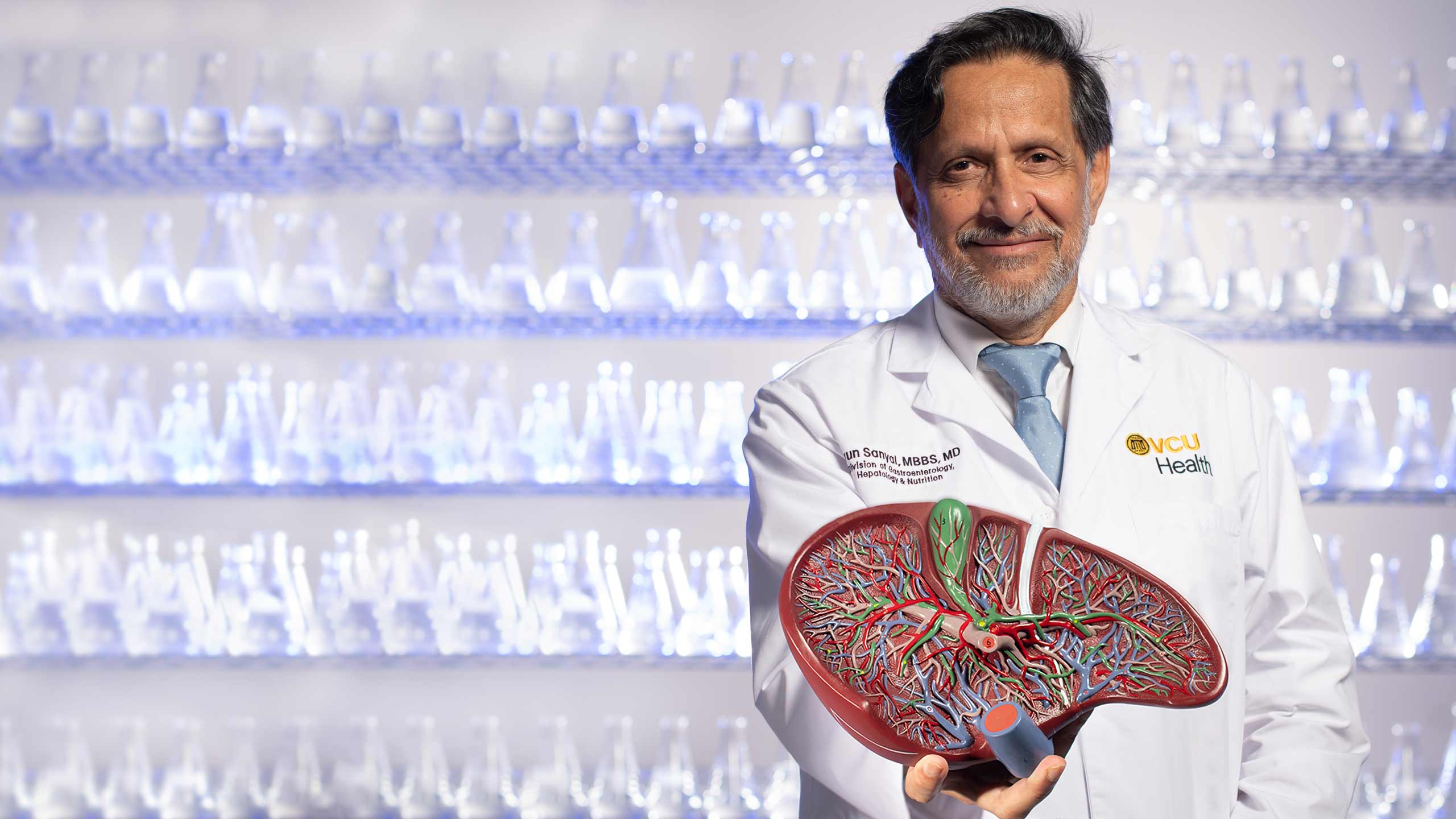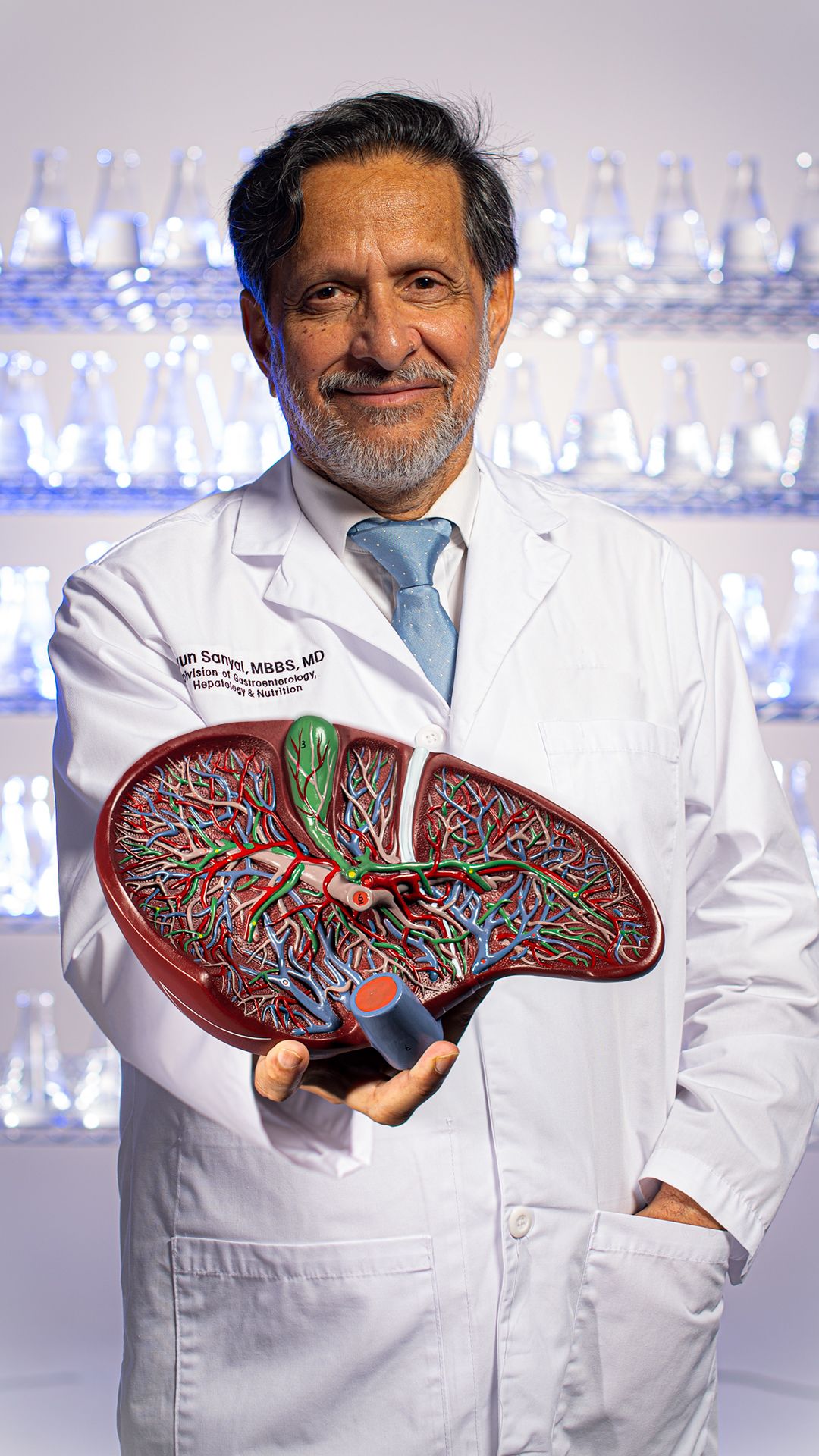UNCOMMON HEROES
VCU is a gathering place of the brightest minds creating impact on a global scale.
This “Uncommon Heroes” series takes a look inside some of them to find out what makes them so brilliantly unparalleled.

UNCOMMON HEROES
VCU is a gathering place of the brightest minds creating impact on a global scale. This “Uncommon Heroes” series takes a look inside some of them to find out what makes them so brilliantly unparalleled.

One liver. Millions of lives.
Liver disease is called the “silent killer” because the liver won’t tell you when things start to go wrong. It is among the world’s top causes of death. It will quietly keep trying to work away until one day it just gives up. And when the liver goes down, everything goes down. It is the driver of human health and well-being.
In 2022, the VCU Stravitz-Sanyal Institute for Liver Disease and Metabolic Health was founded through the largest publicly shared gift for liver research in U.S. history. In two short years, Dr. Arun Sanyal and his team of researchers and clinicians have shown the world that they can do what others can’t. Or won’t. From breakthrough drug therapies to global partnerships that bring cutting-edge research to the world, Sanyal and his team are revolutionizing how liver disease is treated — and prevented.
During a recent interview, Dr. Sanyal reflected on the origins of his passion for hepatology, a path he was drawn to early in his career. “When I was in training here at VCU decades ago, it struck me how patients with liver disease invariably got worse, with very few options available,” he recalls. Liver transplants were still in their infancy, leaving many patients without hope. “That experience drove me to work with patients dying from end-stage liver disease, which led us to develop treatments now used worldwide.”
Bringing global vision to life
This deep commitment to illuminate how vital the liver is to longevity has culminated in the establishment of an institute that, in just two short years, has expanded its reach across the globe. Through partnerships with institutions in Brazil, Mexico, Singapore and India, Dr. Sanyal and his team are actively bridging the gap between research and real-world medical application. “There’s no point in solving a problem only to put the solution on a shelf,” Dr. Sanyal asserts. “We have to get it into the hands of people treating patients all over the world.”
One of the institute’s most remarkable achievements is its success in treating metabolic dysfunction-associated steatohepatitis (MASH), a condition that affects over a billion people globally and can lead to cirrhosis, liver cancer and even death. Through rigorous clinical trials, Dr. Sanyal and his team have shown that 70%-80% of patients with advanced MASH can now experience disease resolution with drug therapy. “We can even reverse liver scarring and, for those with early-stage disease, wipe it out completely in 90% of patients.”
From breakthrough drug therapies to global partnerships that bring cutting-edge research to the world, Dr. Sanyal and his team are revolutionizing how liver disease is treated – and prevented.

Disrupting medicine’s status quo
At VCU, a bold, three-part vision is driving forward a new approach to health care, one that positions VCU as a transformative leader among academic medical institutions. With a unique focus on patient-centered research, strategic public-private partnerships and a global outlook, VCU is actively reshaping the traditional academic model to deliver more relevant, impactful and accessible health care solutions. This combination of disruption and innovation is not only changing the future of medicine, but is positioning VCU as a model for institutions worldwide.
According to Dr. Sanyal, changing entrenched behaviors and mindsets remains one of the team’s biggest hurdles. “We’re disruptive in the way we approach problems, but disruption is the only way to transform medicine and, ultimately, human health,” he says.
The most vital of vital organs
Looking ahead, Dr. Sanyal is optimistic about the future of liver and metabolic health. He envisions a world where liver disease and its associated conditions — diabetes, heart disease and even Alzheimer’s — are not only treated but prevented. “If we can target people between the ages of 10 and 20, when they’re at risk of developing metabolic diseases, we can keep all their organs intact and prevent these diseases from taking hold.”
Thanks to his tireless leadership and pursuit of excellence, the institute is becoming the global leader in liver health, known for preventing metabolic disorders rather than simply treating their aftermath. “We are developing preventive strategies that will allow people to live full lives without ever needing a stent or transplant.”
For Dr. Sanyal, the liver is more than just an organ — it’s the unsung hero to unlocking better health outcomes for millions. “The liver is the driver of human health and well-being,” he says. “When the liver shuts down, every other organ in the body is affected. By focusing on the liver, we can transform human health.” In other words, its health has a domino effect and can mean the difference between life or death. “The day I put myself out of a job as a transplant hepatologist, that’s the day I’ll know we’ve succeeded.”
Once you know how vital the liver is to longevity, it will be your hero, too.
As a top 20% global university, Virginia Commonwealth University is an unparalleled powerhouse of innovation and creative problem solving. VCU attacks challenges as opportunities to do what others can’t. Or won’t. It’s truly a university unlike any you’ve ever seen.
This custom content is sponsored by Virginia Commonwealth University and developed by Inside Higher Ed's sponsored content team. The editorial staff of Inside Higher Ed had no role in its creation.





